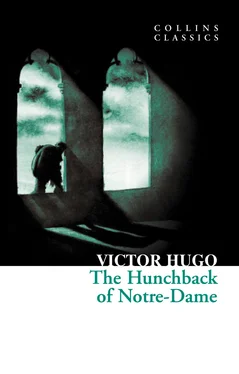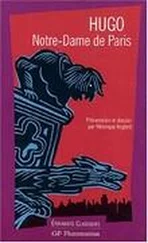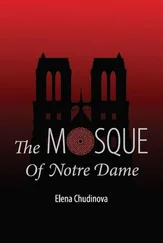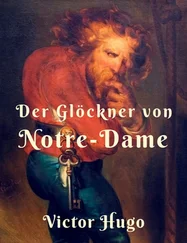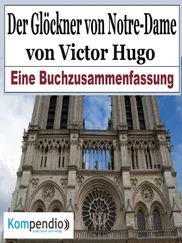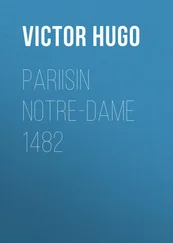The populace thronged the avenues of the law courts in particular, because they knew that the Flemish ambassadors, who had arrived two days previously, intended to be present at the representation of the mystery, and at the election of the Pope of the Fools, which was also to take place in the grand hall.
It was no easy matter on that day, to force one’s way into that grand hall, although it was then reputed to be the largest covered enclosure in the world (it is true that Sauval had not yet measured the grand hall of the Château of Montargis). The palace place, encumbered with people, offered to the curious gazers at the windows the aspect of a sea; into which five or six streets, like so many mouths of rivers, discharged every moment fresh floods of heads. The waves of this crowd, augmented incessantly, dashed against the angles of the houses which projected here and there, like so many promontories, into the irregular basin of the place. In the center of the lofty Gothic *façade of the palace, the grand staircase, incessantly ascended and descended by a double current, which, after parting on the intermediate landing-place, flowed in broad waves along its lateral slopes, the grand staircase, I say, trickled incessantly into the place, like a cascade into a lake. The cries, the laughter, the trampling of those thousands of feet, produced a great noise and a great clamor. From time to time, this noise and clamor redoubled; the current which drove the crowd towards the grand staircase flowed backwards, became troubled, formed whirlpools. This was produced by the buffet of an archer, or the horse of one of the provost’s sergeants, which kicked to restore order; an admirable tradition which the provostship has bequeathed to the constabulary, the constabulary to the maréchaussée , the maréchaussée to our gendarmeri of Paris.
Thousands of good, calm, bourgeois faces thronged the windows, the doors, the dormer windows, the roofs, gazing at the palace, gazing at the populace, and asking nothing more; for many Parisians content themselves with the spectacle of the spectators, and a wall behind which something is going on becomes at once, for us, a very curious thing indeed.
If it could be granted to us, the men of 1830, to mingle in thought with those Parisians of the fifteenth century, and to enter with them, jostled, elbowed, pulled about, into that immense hall of the palace, which was so cramped on that sixth of January, 1482, the spectacle would not be devoid of either interest or charm, and we should have about us only things that were so old that they would seem new.
With the reader’s consent, we will endeavor to retrace in thought, the impression which he would have experienced in company with us on crossing the threshold of that grand hall, in the midst of that tumultuous crowd in surcoats, short, sleeveless jackets, and doublets.
And, first of all, there is a buzzing in the ears, a dazzlement in the eyes. Above our heads is a double ogive vault, panelled with wood carving, painted azure, and sown with golden fleurs-de-lis; beneath our feet a pavement of black and white marble, alternating. A few paces distant, an enormous pillar, then another, then another; seven pillars in all, down the length of the hall, sustaining the spring of the arches of the double vault, in the center of its width. Around four of the pillars, stalls of merchants, all sparkling with glass and tinsel; around the last three, benches of oak, worn and polished by the trunk hose of the litigants, and the robes of the attorneys. Around the hall, along the lofty wall, between the doors, between the windows, between the pillars, the interminable row of all the kings of France, from Pharamond down: the lazy kings, with pendent arms and downcast eyes; the valiant and combative kings, with heads and arms raised boldly heavenward. Then in the long, pointed windows, glass of a thousand hues; at the wide entrances to the hall, rich doors, finely sculptured; and all, the vaults, pillars, walls, jambs, panelling, doors, statues, covered from top to bottom with a splendid blue and gold illumination, which, a trifle tarnished at the epoch when we behold it, had almost entirely disappeared beneath dust and spiders in the year of grace, 1549, when du Breul still admired it from tradition.
Let the reader picture to himself now, this immense, oblong hall, illuminated by the pallid light of a January day, invaded by a motley and noisy throng which drifts along the walls, and eddies round the seven pillars, and he will have a confused idea of the whole effect of the picture, whose curious details we shall make an effort to indicate with more precision.
It is certain, that if Ravaillac had not assassinated Henri IV., there would have been no documents in the trial of Ravaillac deposited in the clerk’s office of the Palais de Justice, no accomplices interested in causing the said documents to disappear; hence, no incendiaries obliged, for lack of better means, to burn the clerk’s office in order to burn the documents, and to burn the Palais de Justice in order to burn the clerk’s office; consequently, in short, no conflagration in 1618. The old Palais would be standing still, with its ancient grand hall; I should be able to say to the reader, “Go and look at it,” and we should thus both escape the necessity, I of making, and he of reading, a description of it, such as it is. Which demonstrates a new truth: that great events have incalculable results.
It is true that it may be quite possible, in the first place, that Ravaillac had no accomplices; and in the second, that if he had any, they were in no way connected with the fire of 1618. Two other very plausible explanations exist: First, the great flaming star, a foot broad, and a cubit high, which fell from heaven, as every one knows, upon the law courts, after midnight on the seventh of March; second, Théophile’s quatrain,—
“Sure, ’twas but a sorry game
When at Paris, Dame Justice,
Through having eaten too much spice,
Set the palace all aflame.”
Whatever may be thought of this triple explanation, political, physical, and poetical, of the burning of the law courts in 1618, the unfortunate fact of the fire is certain. Very little today remains, thanks to this catastrophe—thanks, above all, to the successive restorations which have completed what it spared—very little remains of that first dwelling of the kings of France—of that elder palace of the Louvre, already so old in the time of Philip the Handsome, that they sought there for the traces of the magnificent buildings erected by King Robert and described by Helgaldus. Nearly everything has disappeared. What has become of the chamber of the chancellery, where Saint Louis consummated his marriage? the garden where he administered justice, “clad in a coat of camelot, a surcoat of linsey-woolsey, without sleeves, and a sur-mantle of black sandal, as he lay upon the carpet with Joinville?” Where is the chamber of the Emperor Sigismond? and that of Charles IV.? that of Jean the Landless? Where is the staircase, from which Charles VI. promulgated his edict of pardon? the slab where Marcel cut the throats of Robert de Clermont and the Marshal of Champagne, in the presence of the dauphin? the wicket where the bulls of Pope Benedict were torn, and whence those who had brought them departed decked out, in derision, in copes and miters, and making an apology through all Paris? and the grand hall, with its gilding, its azure, its statues, its pointed arches, its pillars, its immense vault, all fretted with carvings? and the gilded chamber? and the stone lion, which stood at the door, with lowered head and tail between his legs, like the lions on the throne of Solomon, in the humiliated attitude which befits force in the presence of justice? and the beautiful doors? and the stained glass? and the chased ironwork, which drove Biscornette to despair? and the delicate woodwork of Hancy? What has time, what have men done with these marvels? What have they given us in return for all this Gallic history, for all this Gothic art? The heavy flattened arches of M. de Brosse, that awkward architect of the Saint-Gervais portal. So much for art; and, as for history, we have the gossiping reminiscences of the great pillar, still ringing with the tattle of the Patru.
Читать дальше
